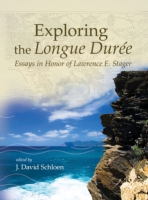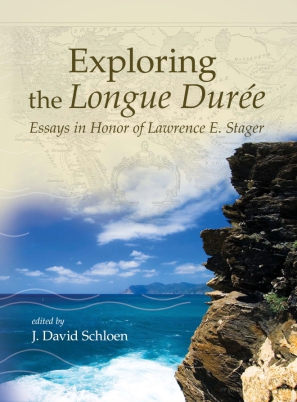Exploring the Longue Durée
Essays in Honor of Lawrence E. Stager
Edited by J. David Schloen
Fifty scholars who represent a wide range of nationalities and specialties—archaeologists, biblical scholars, philologists, and historians—have contributed essays in honor of Lawrence E. Stager, the Dorot Professor of the Archaeology of Israel and Director of the Semitic Museum at Harvard University, on the occasion of his 65th birthday. Various academic generations are represented: among the contributors to this volume are Professor Stager’s former students and some of his own teachers, as well as a diverse group of his many friends and colleagues of all ages. Moreover, the studies collected herein span the gamut from detailed analyses of sites, artifacts, and texts to broad theoretical syntheses. Several authors draw directly upon Stager’s theoretical work, invoking his model of “port power” and his ideas about kinship and “patrimonialism” in ancient Israel, thereby demonstrating his influence as one of the leading Near Eastern archaeologists of his generation. Others discuss archaeological phenomena that have figured prominently in Stager’s research over the years, such as ancient horticulture, Iron Age houses and villages, and finds related to the site of Ashkelon in Israel, where he has directed excavations since 1985. The remaining chapters are a fascinating sample of research in biblical studies (often with a sociological emphasis, as in Stager’s own work), in nonbiblical philology, and in the archaeology of Israel and the eastern Mediterranean region in the Bronze and Iron Ages.
- Description
- Table of Contents
Preface
Contributors
Abbreviations
Publications of Lawrence E. Stager
1. Lawrence Stager and Biblical Archaeology J. David Schloen
2. Solomon’s Patrimonial Kingdom: A View from the Land of Gilead Tristan J. Barako
3. The Dolphin Jug: A Typological and Chronological Assessment Manfred Bietak and Karin Kopetzky
4. Assyrians Abet Israelite Cultic Reforms: Sennacherib and the Centralization of the Israelite Cult Elizabeth Bloch-Smith
5. “Those Who Add House to House”: Household Archaeology and the Use of Domestic Space in an Iron II Residential Compound at Tell en-Na.beh Aaron J. Brody
6. More Light on Old Reliefs: New Kingdom Egyptian Siege Tactics and Asiatic Resistance Aaron A. Burke
7. Cores, Peripheries, and Ports of Power: Theories of Canaanite Development in the Early Second Millennium B.C.E. Susan L. Cohen
8. The Social Worlds of the Book of Job Michael D. Coogan
9. Telltale Remnants of Oral Epic in the Older Sources of the Tetrateuch: Double and Triple Proper Names in Early Hebrew Sources and in Homeric and Ugaritic Epic Poetry Frank Moore Cross
10. Merenptah’s “Israel,” the Bible’s, and Ours William G. Dever
11. Linchpins Revisited Trude Dothan and Alexandra S. Drenka
12. Cities, Villages, and Farmsteads: The Landscape of Leviticus 25:29–31 Avraham Faust
13. Destructions: Megiddo As a Case Study Israel Finkelstein
14. The Late Iron Age II Incense Altars from Ashkelon Seymour Gitin
15. Palmachim–Giv’at Ha’esev: A Navigational Landmark for Ancient Mariners? Ram Gophna and Shmuel Liphschitz
16. Wine for the Elite, Oil for the Masses: Some Aspects of Early Agricultural Technology in Cyprus Sophocles Hadjisavvas
17. The Dawn of an Age: Megiddo in the Iron Age I Baruch Halpern
18. Compositional Techniques in the Book of Haggai Paul D. Hanson
19. Lifting the Veil on a “Dark Age”: Tayinat and the North Orontes Valley during the Early Iron Age Timothy P. Harrison
20. Other Edens Ronald Hendel
21. The House of the Father at Iron I Tall al-’Umayri, Jordan Larry G. Herr
22. Israel’s Ancestors Were Not Nomads Theodore Hiebert
23. How Much Is That in ? Monetization, Money, Royal States, and Empires John S. Holladay
24. The Levitical Diaspora (I): A Sociological Comparison with Morocco’s Ahansal Jeremy M. Hutton
25. A Cypriot Workshop of Middle Bronze Age Askoi Vassos Karageorghis
26. Slavery in Antiquity Philip J. King
27. Ethnic Identity in Biblical Edom, Israel, and Midian: Some Insights from Mortuary Contexts in the Lowlands of Edom Thomas E. Levy
28. A Reconstruction of Achaemenid-Period Ashkelon Based on the Faunal Evidence David Lipovitch
29. Hazael, Birhadad, and ther. Aren M. Maeir
30. Divination at Ebla during the Old Syrian Period: The Archaeological Evidence Nicol. Marchetti
31. Egyptian Fingerprints at Late Bronze Age Ashkelon: Egyptian-Style Beer Jars Mario A. S. Martin
32. From the Buqê’ah to Ashkelon Daniel M. Master
33. The Iron Age Dwellings at Tell Qasile Amihai Mazar
34. The Armor of Goliath Alan Millard
35. Facts or Factoids? Some Historical Observations on the Trophy Inscription from Kition (KAI 288) Paul G. Mosca
36. Ashkelon under the Assyrian Empire Nadav Na’aman
37. The Built Tombs on the Spring Hill and the Palace of the Lords of Jericho (‘dmr r.’) in the Middle Bronze Age Lorenzo Nigro
38. A New Join of Fragments of the Baal Cycle Dennis Pardee
39. L’inscription phénicienne du pithos d’Amathonte et son contexte Émile Puech
40. A Fragmentary Tablet from Tel Aphek with Unknown Script Itamar Singer
41. Camels in Ur III Babylonia? Piotr Steinkeller
42. A Persian-period Hoard of Bullae from Samaria Ephraim Stern
43. Trade and Power in Late Bronze Age Canaan Michael Sugerman
44. East of Ashkelon: The Setting and Settling of the Judean Lowlands in the Iron Age IIA Ron E. Tappy
45. The Books of the Hebrew Bible As Material Artifacts Karel van der Toorn
46. The Temple Mount in Jerusalem during the First Temple Period: An Archaeologist’s View David Ussishkin
47. The Israelite mi.p..â, the Priestly Writings, and Changing Valences in Israel’s Kinship Terminology David S. Vanderhooft
48. Two New Hellenistic Lead Weights of the Tanit Series Samuel R. Wolff and Gerald Finkielsztejn
49. Behavioral Patterns in Transition: Eleventh-Century B.C.E. Innovation in Domestic Textile Production Assaf Yasur-Landau
50. Bedhat esh-Sha’ab: An Iron Age I Enclosure in the Jordan Valley Adam Zertal and Dror Ben-Yosef
Mailing List
Subscribe to our mailing list and be notified about new titles, journals and catalogs.




